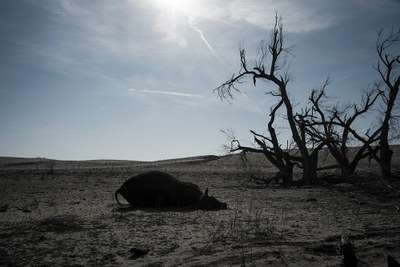
Dana Bay, Woodward County Extension agricultural educator, was supposed to be taking a well-earned vacation. She had turned in and gotten her leave approved and everything. But once the wildfires hit, her vacation spot quickly became the Harper County Extension Office, manning the phones, providing science-based solutions for recovery practices and helping to coordinate relief supplies and a host of much-needed services with public and private entities.
“The state of Oklahoma stepped up,” she said. “The nation stepped up. The farming community, ranching community, were just, I mean, their response was overwhelming. It restores your faith in humanity.”
Bay, McBee – whose own house had been spared by only a few hundred yards – and their colleagues were soon handling hundreds of phone calls per day from those wishing to help. Hay was trucked in from across the country, some producers providing the hay, others providing the transport and some doing both.
“There was this elderly gentleman from Wisconsin who told me he was coming, flat out like why on Earth would he not be coming, wanting to know where to take the hay,” McBee said. “His biggest concern was not any hardship the trip might make for him or his own small operation. He was focused on the practical and wanted to know what I knew about travel restrictions for hauling big loads of hay in the states between Oklahoma and Wisconsin.”
The need for hay and supplemental feed for surviving livestock, milk replacer for young calves that had lost their mothers, and fencing supplies to restore boundaries and protect wandering animals on what had become once again a wide open prairie quickly mushroomed. The words of the day – every day – were “more” and “fast.”
Araine Cash, Harper County Extension Office administrative assistant, said Extension worked with cooperating partners to organize hay drops of more than 20,000 bales, in addition to large amounts of fencing supplies, supplemental feed for livestock, and food and water for volunteers and families in need.
“The hours put in by volunteers were absolutely insane,” she said, “from those in agriculture, youth groups and everyday people just wanting to help.”
Cash herself would work at the county office in Buffalo and then drive down to Laverne, where she would help organize relief drop-off efforts at Tyree Ag, along with personnel from OSU Cooperative Extension, cooperating partners such as the Oklahoma Cattlemen’s Association and Oklahoma Department of Agriculture, Food and Forestry; local churches and civic organizations; regional agribusinesses; and employees of Tyree Ag itself, such as Office Manager Molly Green.
“Somebody was pretty much working around the clock,” Green said, who at one point had a front row seat of the wildfire, which passed the Tyree Ag complex just across the highway and then doubled back, eventually stopping a mere 50 yards away.
Green and her colleagues saw the flames doubling back, quickly called 9-1-1 and got to safety. In the aftermath, truckers dropping off their first loads of hay would take a long look at the charred surroundings and comment, “that got plenty close to you guys.”
“Yes, we would reply, and then we all would get on with what needed to be done to help those in need,” Green said. “It was close but there were so many others not as fortunate as us.”
Source: okstate.edu